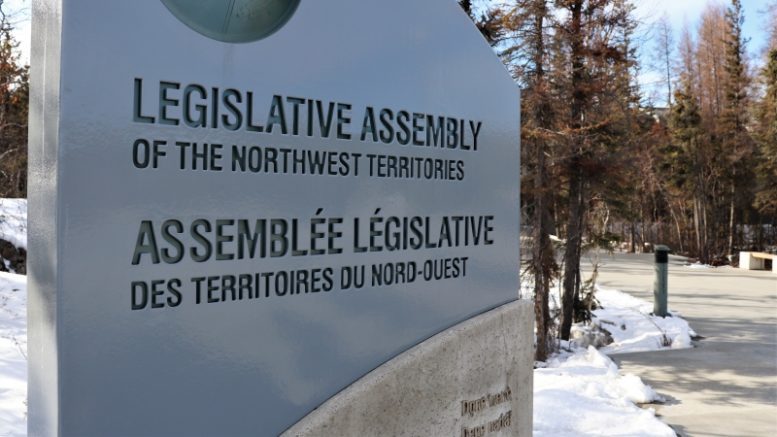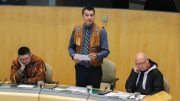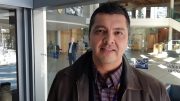Dene Nation criticized the Legislative Assembly for not adequately following the Official Languages Act in a submitted document.
The document was submitted to a public hearing held on Nov. 17, on the use of official languages in the Legislative Assembly.
‘Point of privilege’
The public hearing was held due to an incident on March 10 when no Tłı̨chǫ interpreter was available at the Legislative Assembly.
Jackson Lafferty, the MLA for Monfwi, says this prevented him from doing his job.
Lafferty raised a point of privilege as the Official Languages Act says that everyone has the right to use an official language in the debates and other proceedings of the Legislative Assembly.
The public hearing was held because the rules of the Legislative Assembly are silent on the right of members to use an official language other than English in the chamber.
It is also doesn’t say whether other members have a right to understand what is being said when someone speaks in an official language other than English.
The public hearing was originally scheduled for October, but was postponed in an effort to attract more public engagement. The event still only received one presentation from Radio Taiga, a French-language radio station in Yellowknife, and two submitted documents: one from Dene Nation and another from the Yellowknives Dene First Nation (YKDFN).
As one of the organizations to engage, Dene Nation wrote in its submission that the incident on March 10 is an example of a much larger problem.
“We saw the uneven power dynamics of language first-hand when MLA Lafferty (Monfwi) was unable to participate in the proceedings of the Legislative Assembly to which he was elected, as no Tłı̨chǫ language interpretation was readily available,” Dene Nation wrote.
According to Dene Nation’s report, between the years 1989 and 2014, the number of people over the age of 15 who speak Indigenous languages dropped by nearly 17 per cent.
Kevin O’Reilly, the MLA for Frame Lake is the chair of the Standing Committee on Rules and Procedures.
He says he would’ve liked more presenters, but will nonetheless be discussing the information with the committee to complete a formal report.
“The scope of what we’re looking at is fairly narrow, but we’re happy to get the input that we’ve got so far,” O’Reilly says.
Interpreter and Translator program
The YKDFN pitched a potential solution in its submitted a document to the committee.
The document requested the Government of the Northwest Territories re-launch an Interpreter and Translator program that was previously run out of Aurora College.
The letter said many of the interpreters and translators who provide interpretation for the Legislative Assembly are nearing retirement and there is no program to replace them.
Jayne Murray, a spokesperson for Aurora College, confirmed in an email the Interpreter-Translator Certificate and Diploma programs have not been offered at Aurora College since 1998.
She adds, Aurora College is aware of the importance of all of the Indigenous Languages in the NWT and the institution just completed the Certificate in Indigenous Language Revitalization program. This was in conjunction with the University of Victoria and the NWT Department of Education, Culture and Employment.
The focus of this certificate is the revitalization of Indigenous languages and produced 13 graduates in March 2020, Murray says.
Recommendations
Going forward, the standing committee will be completing a report with a list of recommendations on the subject of official languages in the Legislative Assembly for the next sitting.
The report from the committee will be tabled in the house where the recommendations will be discussed and voted upon, O’Reilly says.
O’Reilly says the incident has highlighted the need for “changes” to certain rules in the Legislative Assembly.
“Those rules do need to be adjusted to recognize that members have the right to speak, any of the official languages and actually be understood as well,” he says. “Perhaps this might feed into how the future budgets for the Legislative Assembly better reflect the needs for using official languages.”
The committee is also in the process of conducting a five-year review of the Official Languages Act.
Luke Carroll is a journalist originally from Brockville, Ont. He has previously worked as a reporter and editor in Ottawa, Halifax and New Brunswick. Luke is a graduate of Carleton University's bachelor of journalism program. If you have a story idea, feel free to send him an email at luke.carroll@cklbradio.com









